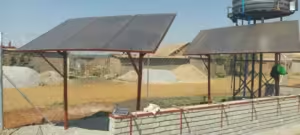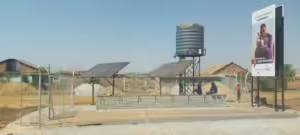
By Noah Pomo. Harare. Music legend Alick Macheso together with Pacific Storm and other un-named partners handed over a 60m solar powered borehole in Dzivaresekwa extension, about 3km from Dzivaresekwa (formerly Gillingham), one of Zimbabwe’s oldest ghetto suburbs together with Mbare, Mufakose, Highfields, Mabvuku and Chitungwiza.
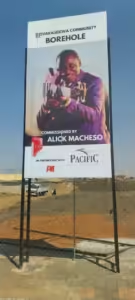
Macheso became one of Zimbabwe’s leading musicians at the turn of the millennium. He started his career with Nicholas Zachariah and also Systems Tazvida and boys dze Simoko, as a bassist, although he is very good on guitar also. His solo career was defined by his honest lyrics, exuberant personality and his signature “Borrowdale dance move.” His experimental instrumentals feature some of Zimbabwe’s most innovative melodies in a genre that was already decades old by the turn of the millenium.
Zimbabwe and its diaspora has a large constituency of Macheso fans. his move to venture into social responsibility with corporate partners went down very well with his fans in this neighborhood and further cemented his legacy.
Dzivaresekwa Extension is 20km away from Harare city centre on Kirkman road. It’s a fairly new suburb, about 2 decades old. The home owners we met were mostly in their 40s.
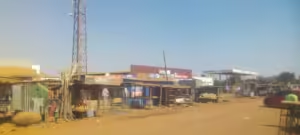
Macheso emotionally said: “I am happy to come here. I stayed in Dzivaresekwa 2 in Chinokoro road. These (DZ Extension) were my hunting grounds and the mice knew me by name. I hunted in Snake Park, Mt Hampden, DZ stadium. I survived on mice selling as a business. I even started employing others in that business. God is good! He rescued me from surviving on selling mice.”
“I vividly remember those times. I almost got bitten by a snake at an anthill just a few meters from this place where we are gathered today. I used to smoke pipes into the holes and if the smoke came out on the other end it meant there were no mice. I survived like that until others copied me. The Dzivaresekwa river was sacred. I would still catch fish in there. No one else could do it. I am just grateful. I stayed here from 1983 to 1986.”
Residents of, and visitors to, DZ can remember the new stands in DZ4 in the mid-1980s. The forest fields Macheso described were closer to DZ1 to 3, the older Smith-era ghetto area.
Macheso thanked Pacific Storm for their benevolence. He urged the locals to carefully look after the borehole with 10 water taps. Macheso was mobbed by his adoring fans.
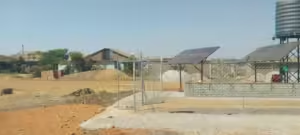
Just a few days earlier president Emerson Munangagwa was in the area opening another block of flats for Civil servants in a place experiencing urban renewal already.
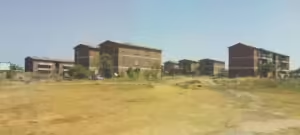
The roads are especially bad in summer due to the red soil type, known in local shona language as “Jiho.” The soil can easily flood in summer and dries up in the dry months.
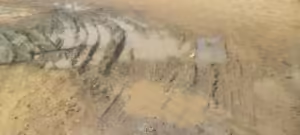
Ambitious first-time home owners built slowly but surely in the area known as Pure Gold which is more low density. The area behind, Federation, is a slum or ghetto with youthful gangs. Tensions over scarce borehole water are common in Pure Gold, an area with neither running water nor electricity. Solar power is the most common.
Macheso, who speaks Chewa from Malawi thanked Pacific for bringing him near “his bosses” or legion of fans: “This is are is full of water. I have been around the world with my music. I have been to Australia, to England. Guitars are good. They entertain us. Guitars heal us. Many wanted to commit suicide but changed their minds after listen to the gospel, the message in music.”
The emotional musician cut the ribbons and opened the gates before testing each one of the 10 taps with fans fearing he might ‘get drunk” on so much.
